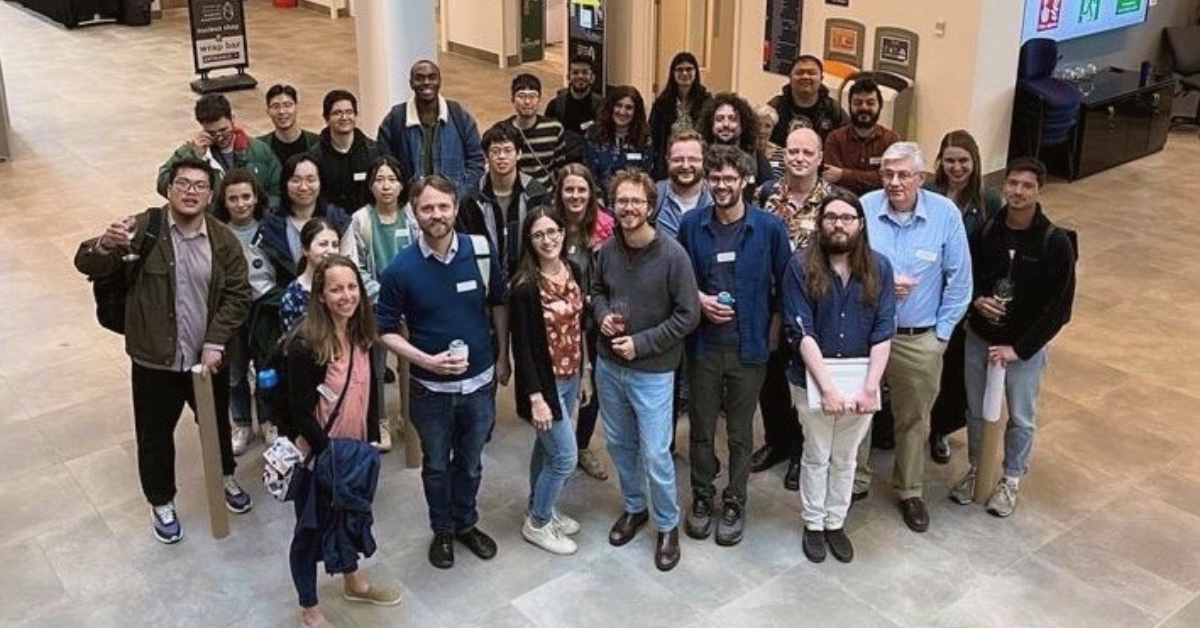Centre for Statistics Annual Conference 2024

By Nadia Johnson, Research Communications Intern 2024
The Centre for Statistics Annual Conference highlights innovative research in the statistical sciences, bringing together data-driven researchers from the University of Edinburgh and associated institutions. The one-day event included talks by a number of invited speakers from academia and industry, along with a lunch break and poster presentation session. This year’s conference took place on June 18th, in the Nucleus building at the University’s King’s Buildings campus.
Director of the Centre for Statistics, Tim Cannings, said of the event: ‘This year’s conference featured a fantastic line up of speakers from across all three colleges at the University of Edinburgh, as well as industry.
We had 20 poster presentations and more than 80 participants. As in previous years, the event highlighted the quality and breadth of the multidisciplinary data-centric research being carried out in and around the University. There is a thriving statistical community in Edinburgh – as CfS director, it was a pleasure to bring everyone together to showcase our research and to help facilitate new multidisciplinary collaborations.’
I attended this year’s conference as a Research Communications Intern at the School of Mathematics, and was both excited and intrigued at what the day would bring. The event began with the first session of talks, chaired by the School of Mathematics’ Andrej Svetlošák. This included a talk by Roger Halliday from Research Data Scotland, who discussed the benefits of data linkage and how this can help both researchers and the general public; for instance, by making data more accessible to use in research studies.
Following this was School of Engineering lecturer Elliot Crowley’s talk on machine learning and neural networks, in which he discussed the strengths of neural architecture search algorithms, which can be used to automate the design of artificial neural networks. He also introduced ‘einspace’, a search space for neural architecture search.

Following a coffee break, there was the second session of talks, chaired by Glenna Nightingale from the School of Health in Social Science. The first was delivered by Cecilia Balocchi from the School of Mathematics, who discussed improving uncertainty quantification in Bayesian cluster analysis. It was interesting to see how the researchers’ work could help improve our understanding of uncertainty in mathematics. Next was Edward Wallace’s talk on mRNA regulation, discussing its role in enabling fungal cells to grow and adapt to changing environments. He also discussed the statistical challenges in this work, particularly when using non-standard experimental designs.
After the second session, there was a longer break for lunch and poster presentations. The topics of these posters spanned a variety of fields, from predicting adverse weather events to modelling connectivity patterns in the brain. It was impressive to see the range of topics covered, and how differently people presented their work!

Posters from left to right: ‘A hierarchical Bayesian mixture approach for modelling neuronal connectivity patterns from MAPseq Data’ (pictured: Edward Adboraw), ‘Mapping Shifts in Winter Weather to Energy Demand for Forward-Looking Risk Assessments’ (pictured: Aninda Bhattacharya), ‘Wind Energy Probabilistic Scenarios’ (pictured: Sergio Gomez Anaya)
Then came the final session of the day, chaired by Takuo Matsubara from the School of Mathematics. The first of these talks, by Xuebin Zhao (School of GeoSciences), introduced a more cost- and time-efficient method for updating prior information in Bayesian inference solutions, which they called VPR (short for ‘methodology variational prior replacement’). This can help in scientific investigations where researchers might wish to change prior information, for instance to test different states of information as separate hypothesis tests in a study. He also touched on its potential for use with more computationally demanding problems.
Roxanne Connelly from the School of Social and Political Science brought a sociology perspective to statistics, discussing the link between social class, gender, ethnicity and children’s educational enjoyment, with some interesting findings – for instance, that social class was not found to have an effect on children’s educational enjoyment.

The final talk of the day, delivered by Mirella Lapata from the School of Informatics, discussed Natural Language Processing and the benefits of specialist models. This covered a range of subtopics, from how to create your own language model to some entertaining examples, using soap operas, of how AI can create video summaries. After sparking an interesting discussion on the extent of AI use, this concluded the final session of the day.
Overall, this year’s CfS conference was a highly rewarding experience which I feel very grateful to have been able to attend! If you have a mathematics background or are interested in statistics, I’d definitely recommend attending in future as the vast range of statistics applications might surprise you. To reference a Proust quote mentioned in Mirella’s talk: ‘The real voyage of discovery consists not in seeking new landscapes, but in having new eyes.’
If you’re interested in similar events, keep an eye on the School of Maths social media pages
Follow us on X | LinkedIn | Facebook | Instagram | TikTok
Visit the Centre for Statistics website
Upcoming Centre for Statistics events
(Nadia Johnson)



